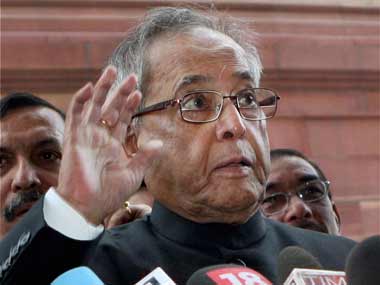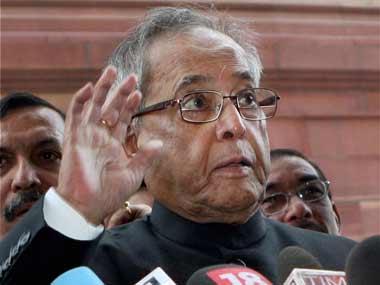Nothing concentrates the mind so wonderfully as the prospect of a hanging in the morning. On that count, there is a silver lining to yesterday’s GDP data release, which points to an economy that’s in free fall . If the data had come even in halfways-decent, our back-patting policymakers, starting from the Mickawberish Mr Mukherjee , would have given themselves over to yet more pious self-congratulation - and persisted with the disastrous economic mismanagement of recent years.
However, in his public pronouncements after the shocking numbers came in, Finance Minister Pranab Mukherjee gave no indication that he was seized of the extent of the crisis that confronts the Indian economy. Mukherjee insisted that while the data was “disappointing” - a phenomenally weak encapsulation of the gravity of popular sentiment - the worst of the slowdown was over.
[caption id=“attachment_322779” align=“alignleft” width=“380” caption=“Wake up, Pranab-da. PTI”]
 [/caption]
[/caption]
He then proceeded to reel off what he saw as the positive elements in the data and the policy environment. “The (interest) rate cycle,” he said, “has been reversed, mining sector growth has turned around, progress has been made on fuel linkage for coal-based power projects, there is a turnaround in the investment growth rate in the fourth quarter, which had been negative in the preceding quarters of 2011-12, and a normal south-west monsoon has been predicted for 2012-13. There are no major adverse results on corporate performance in the last quarter of 2011-12. All these factors should help in the recovery of growth momentum.”
Pranab-da’s sunny optimism - that “all eej well” - would, of course, be a good antidote to the doom-and-gloom sentiment all around - if the crisis weren’t as severe. As I’d noted earlier ( here ), Mukherjee has a ‘Micawberish’ streak in him: like the cheerfully optimistic fictional character in Charles Dickens’ David Copperfield, Mukherjee budgets only for best-case macroeconomic scenarios, perhaps in the hope that “something will turn up” to validate his assumptions and his rosy numbers.
Yet, that “something that turns up” has invariably been a nasty shock that drags down the economy even further, which is why Mukherjee’s words of optimism today lack conviction. It also explains why the man has consistently fall short on his estimates.
The less charitable explanation for Mukherjee’s failing would be that is being deliberately dishonest: that he has had a good luck at the numbers, understands the gravity of the problem, but mouths platitudes - knowing that if he is elected President (a job for which he has exhibited an evident interest ), the economic mess is someone else’s problem.
But that opens up another explanation for Pranab-da’s glibness, which points to an even more serious failing: that the man is in denial, and genuinely believes that there’s nothing fundamentally wrong with the economy.
It’s not just about Mukherjee, though. It’s increasingly becoming clear that some of the most venerated economic minds in the current administration have colossally misread the economic situation, even though the commentariat had been raising red flags for long. (For instance, here and here and here and here .)
What they saw as a cyclical downturn - the ‘what goes up must come down’ rationale - was in fact a systemic grinding down of the economy. And since they’d got the diagnosis so wrong, their prescriptions for remedy were way off the mark. Policy errors and inaction over an extended period of time compounded the underlying problem - until today we are staring at a crisis.
Pranab-da’s reading - that the “worst is over” - is fundamentally flawed. Since the government has not even begun to address the structural nature of the problems - the runaway deficits, the subsidy pile, the collapse of investments - the slowdown will drag on for a lot longer.
Thus far, the government has been running scared of taking the bold measures that, while inflicting pain in the short term, are necessary to revive growth over the medium term. Its chickening out of the move to raise the price of diesel and LPG, and even its manifest attempts to distance itself from the recent petrol price hike (claiming fatuously that it was an administrative decision by oil marketing companies) doesn’t bode well for remedial policy action.
Again, the good thing about the economic shocks that are still to come is that they will force the government to do under duress what it has failed to do by choice. Given the politics of populism that pervades India - in which even the Opposition parties are notoriously culpable - reforms happen in India only by stealth or when governments are dragged kicking and screaming to the marketplace.
Perhaps when growth trends down even further over the next two quarters, even Mr ‘Micawber’ Mukherjee and the economic ‘dream team’ that has inflicted this nightmarish slowdown on us will be compelled to acknowledge the folly of their ways. And be forced to snap out of their state of denial.
Only then can the process of economic recovery begin.
Venky Vembu attained his first Fifteen Minutes of Fame in 1984, on the threshold of his career, when paparazzi pictures of him with Maneka Gandhi were splashed in the world media under the mischievous tag ‘International Affairs’. But that’s a story he’s saving up for his memoirs… Over 25 years, Venky worked in The Indian Express, Frontline newsmagazine, Outlook Money and DNA, before joining FirstPost ahead of its launch. Additionally, he has been published, at various times, in, among other publications, The Times of India, Hindustan Times, Outlook, and Outlook Traveller.
)